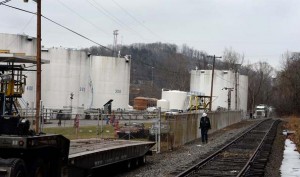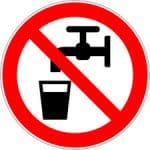Over the past several days, over 300,000 consumers in West Virginia have been unable to use their tap water for any purpose other than toilet flushing due to a chemical leak from coal manufacturer Freedom Industries. The chemical, 4-methylcyclohexane methanol (MCHM), was stored in antiquated 40,000 gallon tanks very close to the Elk River. You can read about the leak here: https://nbcnews.to/1hT9Iz9
Questions are certainly being raised surrounding this crisis. Could it have been handled better? Could it have been avoided altogether? And finally, is there a way to prevent this type of disaster from happening again? And the answer to all is an unequivocal yes.
First, there are no regulations for MCHM, even though some warning flags had been raised. From the Charleston Saturday Gazette-Mail:
Last February, Freedom Industries sent state officials a form telling them the company stored thousands of pounds of a coal-cleaning chemical called 4-methylcyclohexanemethanol in the storage tanks at its Etowah River Terminal.
The facility, along the Elk River not far from downtown Charleston, is about 1.5 miles upstream from the intake West Virginia American Water uses to supply drinking water for 300,000 residents across the capital city and the surrounding region.
Freedom Industries filed its “Tier 2” form under the federal Emergency Planning and Community Right to Know Act. State emergency response officials got a copy. So did emergency planners and responders from Kanawha County.
Under the law, government officials are supposed to use chemical inventory information on Tier 2 forms, like Freedom Industries’, to prepare for potential accidents.
Armed with the forms, they know what facilities could explode, where large quantities of dangerous substances are stockpiled, and what industries could pose threats to things such as drinking water supplies. They can plan how to evacuate residents, fight fires or contain toxic leaks.
On Thursday morning, an unknown amount of the chemical leaked from one of Freedom Industries’ tanks into the Elk River. By late afternoon, West Virginia American Water was warning residents across a nine-county region not only not to drink their water, but also not to use it for anything except flushing toilets or fighting fires.
Now, all manner of federal, state and local agencies are rushing to truck in water and otherwise see to residents’ needs, following Gov. Earl Ray Tomblin’s declaration of a “state of emergency” and President Obama’s order to provide federal assistance.
Those same agencies and public officials, though, have said they know little about the chemical involved. They’re all acting a bit surprised that this mystery substance was being stockpiled so close to a crucial water intake, and shocked that something like this could have happened.
Clearly, state officials were well informed on the location and volume of MCHM near a public water supply, yet they took no action, not even to inspect the tanks. And the reason is simple: there is very little information on the level of toxicity of MCHM, and it is therefore not regulated.
 Freedom Industries’ tanks do not fall under any jurisdiction and do not require any type of inspection because MCHM is not considered hazardous enough to require permitting, even though it causes skin irritation as well as nausea and vomiting. In fact, Freedom Industries wasn\’t under any type of state oversight, said Michael Dorsey, Chief of the State Department of Environmental Protection’s Homeland Security and Emergency Response office.
Freedom Industries’ tanks do not fall under any jurisdiction and do not require any type of inspection because MCHM is not considered hazardous enough to require permitting, even though it causes skin irritation as well as nausea and vomiting. In fact, Freedom Industries wasn\’t under any type of state oversight, said Michael Dorsey, Chief of the State Department of Environmental Protection’s Homeland Security and Emergency Response office.
“In my world – I’m a hazmat guy – this stuff’s below my radar screen until this happens,” said Dorsey. “The tanks themselves, we don’t have the regulatory authority to inspect those tanks.”
Fortunately, that is likely to change. Department of Environmental Protection Secretary Randy Huffman noted, “We are working on some ideas right now. I think a lot of folks will be calling for legislation and rightly so.”
In addition, Freedom Industries themselves failed the public in two ways. First, company executives knew full well that the tanks and retaining walls – dating back to the 1930’s and 40’s – were antiquated and desperately needed replacement. Multiple holes up to one inch in diameter were clearly visible in the tanks and walls, and it is generally accepted that the leak into the water supply was two-fold, through holes in both a tank and a retaining wall. Freedom Industries, in full knowledge of the chemicals they stored, the proximity to the public water supply, and the poor condition of their tanks and walls, clearly operated with gross negligence by failing to replace said tanks and walls. But their negligence doesn\’t stop there.
Freedom Industries did not report or respond appropriately. State law mandates immediate reporting of any chemical spill, yet state environmental workers arrived at the spill site at 11:15am on Thursday because of a phone call from West Virginia American Water Company – not Freedom Industries, said Huffman. The water company, who had received complaints from local residents about a licorice-like smell in the water starting at around 7:30am, was quick to alert authorities. Conversely, Freedom Industries was also aware of the leak yet failed to report it. Two Freedom Industries employees noted the smell as well as the leak at around 10:30am and informed company president Gary Southern, who did not report the spill or attempt any type of containment. This inaction very well may have exacerbated an already dire situation.
“Had they put containment measures in place the instant they knew, it’s logical to deduce that there wouldn’t have been as much product in the stream,” Huffman said.
In response to this gross negligence, there have already been six lawsuits filed against Freedom Industries. On January 13, the DEP demanded that Freedom Industries cease its operation and immediately conduct integrity tests of all storage tanks and secondary containment structures, and on Wednesday, January 15, the DEP issued five citations against Freedom Industries.
 Lastly, there was no plan in place for dealing with such an emergency. The EPA mandates an Emergency Response Plan (ERP) as well as training for utilities servicing over 3,300 customers in case of emergency. The Bioterrorism Act, which went into effect in 2002 in response to the terrorist attacks of September 11, 2001, requires the preparation of an initial ERP, but not its maintenance. The EPA has noted that an ERP is a living document that should be updated annually at a minimum. Without these updates, an ERP quickly loses its efficacy. A sampling of required action items within an ERP include partnerships with law enforcement, public health officials, emergency workers, and first responders from local to federal levels; general emergency response policies and procedures; identification of alternative water sources; chain-of-command chart; communication procedures and notification lists; personnel safety; property protection; training, exercises, and drills; assessment; and general and incident-specific emergency action procedures. Clearly, an ERP is a comprehensive and crucial tool in maintaining public safety and in mitigating damage and difficulty in times of emergency.
Lastly, there was no plan in place for dealing with such an emergency. The EPA mandates an Emergency Response Plan (ERP) as well as training for utilities servicing over 3,300 customers in case of emergency. The Bioterrorism Act, which went into effect in 2002 in response to the terrorist attacks of September 11, 2001, requires the preparation of an initial ERP, but not its maintenance. The EPA has noted that an ERP is a living document that should be updated annually at a minimum. Without these updates, an ERP quickly loses its efficacy. A sampling of required action items within an ERP include partnerships with law enforcement, public health officials, emergency workers, and first responders from local to federal levels; general emergency response policies and procedures; identification of alternative water sources; chain-of-command chart; communication procedures and notification lists; personnel safety; property protection; training, exercises, and drills; assessment; and general and incident-specific emergency action procedures. Clearly, an ERP is a comprehensive and crucial tool in maintaining public safety and in mitigating damage and difficulty in times of emergency.
The water crisis in West Virginia was certainly stressful and inconvenient, impacting local residents and businesses both emotionally and financially. However, West Virginians are fortunate that the leaked chemical was not overly toxic and that, so far, nobody has suffered any long-term effects or lost their life. Hopefully, this crisis will be limited to an inconvenience and used as a warning of how we need to be better prepared in case of a serious water-related emergency. Americans take running water for granted, and we don’t realize our dependence on it until disaster strikes. State and federal agencies need to mandate regulations and inspections to prevent such a spill from reoccurring, and water supplies must update and maintain their ERPs. Because let’s face it: water is something that we simply cannot live without.

